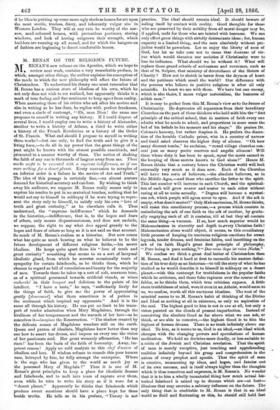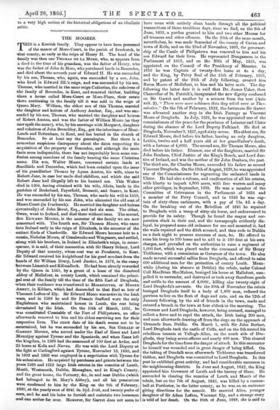M. RENAN ON THE RELIGIOUS FUTURE.
fiRENAN'S new volume on the Apostles, which we hope to e review next week, contains a very remarkable preface, in which, amongst other things, the author explains his conception of the mode in which the new philosophy will affect the future of Christendom. To understand his theory one must remember that M. Renan has a curious store of idealism of his own, which he not only does not wish to see realized, but apparently thinks it a mark of true feeling and fine sentiment to keep spelt from reality. When answering those of his critics who ask after his motive and aim in writing as he has done, he replies with perfect frankness, and even a shade of contempt, " Eh, mon Dieu! the same one proposes to oneself in writing any history. If I could dispose of several lives, I would employ one to write a history of Alexander, another to write a history of Athens, a third to write either a history of the French Revolution or a history of the Order of St. Francis. What end should I propose to myself in writing these works?—but one only, to find the truth and to give it a living form,—to do all in my power that the great things of the past might be known with the utmost possible exactitude, and presented in a manner worthy of them. The notion of shaking the faith of any one is thousands of leagues away from me. These works ought to N executed with a supreme indifference, as if one were writing for a desert planet. Every concession to scruples of an inferior order is a failure in the service of Art and Truth." The idea of this passage is certainly fine,—an almost austere demand for historical accuracy and candour. By wishing to think away his audience, we suppose M. Renan really means only to express his resolve to put in no oratorical touches, nothing that he Would not say to himself in soliloquy if he were trying to repre- sent the story only to himself, to satisfy only his own " love of truth and great curiosity," as he elsewhere calls it. Thus understood, the "supreme indifference" which he demands in the historian,—indifference, that is, to the hopes and fears of others, only means dispassionateness, and does not exclude, we suppose, the right to say what does appeal greatly to the hopes and fears of others so long as it is not said on that account. So much of M. Renan's realism as a historian. But now comes what has quite as much bearing on what he believes to be the foture development of different religious faiths,—his secret idealism. He keeps quite apart from his " love of truth and great curiosity" something that seems to us a sort of lacrymal idealistic gland, from which he secretes occasionally tears of sympathy for certain falsehoods, as he thinks them, which he chooses to regard as full of consolation and beauty for the majority of men. Towards these he takes up a sort of soft, sensuous tone, as of a spiritual gourmand towards artificial viands, or wines recherchi in their bouquet and delicious to the palate of his intellect. "I have a taste," he says, "sufficiently lively for the things of faith, to give me the power of appreciating gently [doucement] what there sometimes is of pathos in the sentiment which inspired my opponents." And it is the same all through his history. He can put no limit to his trans- port of tender admiration when Mary Magdalene, through the liveliness of her temperament and the warmth of her love—so he conceives it—imagines the Resurrection. "The shadow created by the delicate senses of Magdalene wanders still on the earth. Queen and patron of idealists, Magdalene knew better than any one how to assert her dream, and impose on every one the vision of her passionate soul. Her great womanly affirmation, He has risen!' has been the basis of the faith of humanity. Away, im- potent reason! Apply no cold analysis to this chef d'ceuvre of idealism and love. If wisdom refuses to console this poor human race, betrayed by fate, let folly attempt the enterprise. Where is the sage who has given to the world as much joy as the possessed Mary of Magdala ?" Thus it is one of M. Renan's great principles to keep a place for idealistic dreams and falsehoods, and to melt into tears of rapture over them, even while he tries to write his story as if it were for a " desert planet." Apparently he thinks that falsehoods which produce sweet emotions should have a place kept for them beside truths. He tells us in his preface, " Theory is not
practice. The ideal should remain ideal. It should beware of soiling itself by contact with reality. Good thoughts for those who are preserved by their nobility from all moral danger may be, if applied, unfit for those who are tainted with baseness. We can only effect great things with strictly determinate ideas ; for, human capacity is a limited thing, and the man absolutely without pre- judice would be powerless. Let us enjoy the liberty of sons of God, but let us take care not to cause that decrease of vir- tue which would threaten our societies if Christianity were to lose its influence. What should we be without it? What will replace those grand schools of seriousness and reverence, such as that of St. Sulpice, that ministry of devotedness of the Sisters of Charity? How not to shrink in terror from the dryness of heart and the pettiness which assail the 'world? Our difference with the persona who believe in positive religions is after all only scientific. In heart we are with them. We have but one enemy, which is also theirs, I mean vulgar materialism, the baseness of selfish men."
It is easy to gather from this M. Renan's view as to the future of Christianity. He deprecates all separation from their hereditary Churches on the part of those thinkers who hold with him the "first principle of the critical school, that in matters of faith every one admits what he needs to admit, and proportions in some sense the bed of his beliefs to his measure and his shape," He praises Dr. Colense's honesty, but rather despises it. He prefers the discre- tion of the humble Catholic priest, who in a country of narrow and timid mind observes the higher duty of silence. " Oh how many discreet tombs," he exclaims, " round village churches con- ceal just so many poetic reserves and angelic silences! Will those whose duty it has been to speak, equal the merit earned in the keeping of those secrets known to God alone ?" Renee M. Renan thinks that a century hence the Christian world will look externally very much as it does now. Each of the Churches will have two sorts of believers,—the absolute believers, as in the Middle Ages,—and those who sacrifice the letter to the spirit. This last number will increase in each Church, and the spiritual- ists of each will grow nearer and nearer to each other without caring at all to unite actually. " Dogma will become a mysteri- ous ark, which people will agree never to open. And if the ark is empty, what does it matter?" Only Mahometanism, M. Benoit thinks, will resist this conciliatory process,---a process which consists in assimilating the ark of one faith to the ark of another, by gradu- ally emptying each of all it contains, till at last they all contain the same thing—a vacuum. If so, how much superior would be Mahometanism in sincerity and depth to4very Christian faith! Mahometanism alone would object, it seems, to this conciliatory little process of keeping its unctuous religious emotions for sweet legends, tender dreams, and feminine fables, and inscribing on the ark of its faith Hegel's great first principle of philosophy, " Pure being is pure nothing,'t "Das reine Seyn ist reine Nichts."
We confess we think a great deal better of Christendom than M. Renan, and find it hard at first to reconcile his austere defini- tion of his true duty as an historian—to tell the story of what he has studied as he would describe it to himself in soliloquy on a desert planet—with this contempt for truthfulness in the popular faiths which he criticizes, and these false raptures over the source of the fables, as he thinks them, which trite criticism exposes. A. little stern truthfulness of mind, were it even in an Atheist, would seem to us, we confess, worth all this unctuous idealism. The root of the mischief seems to us M. Renan's habit of thinking of the Divine and Ideal as nothing at all in existence, as only an aspiration of the soul. The highest good to him is not in ease at all, but only a vision painted on the clouds of present imperfection. Instead of conceiving the absolute Good as far above what we can ask, or think, or are able to conceive,—the highest Good is to him the highest of human dreams. There is oo truth infinitely above our ideal. To hint, as it seems to us, God is an ideal,—an ideal which changes with the changing powers and speculations of human meditation. We hold no doctrine more deadly, or less suitable to a critic of the Jewish and Christian revelation. That the spirit of man is merely receptive, just touching and apprehending realities infinitely beyond his grasp and comprehension is the axiom of every prophet and apostle. That the spirit of man is creative, summoning up ideas, and hopes, and fancies out of its own recesses, and is itself always higher than the thoughts which it thus conceives and expresses, is M. Renan's. No wonder that it is to him a wholly immaterial thing how much actual his- torical falsehood is mixed up in dreams which are—at best— illusions that may exercise a salutary influence on the future. The only thing that is creditable to M. Renan is that in an ideal world so fluid and fluctuating as this, he should still hold fast
to a very high notion of the historical obligations of an idealistic critic.































 Previous page
Previous page